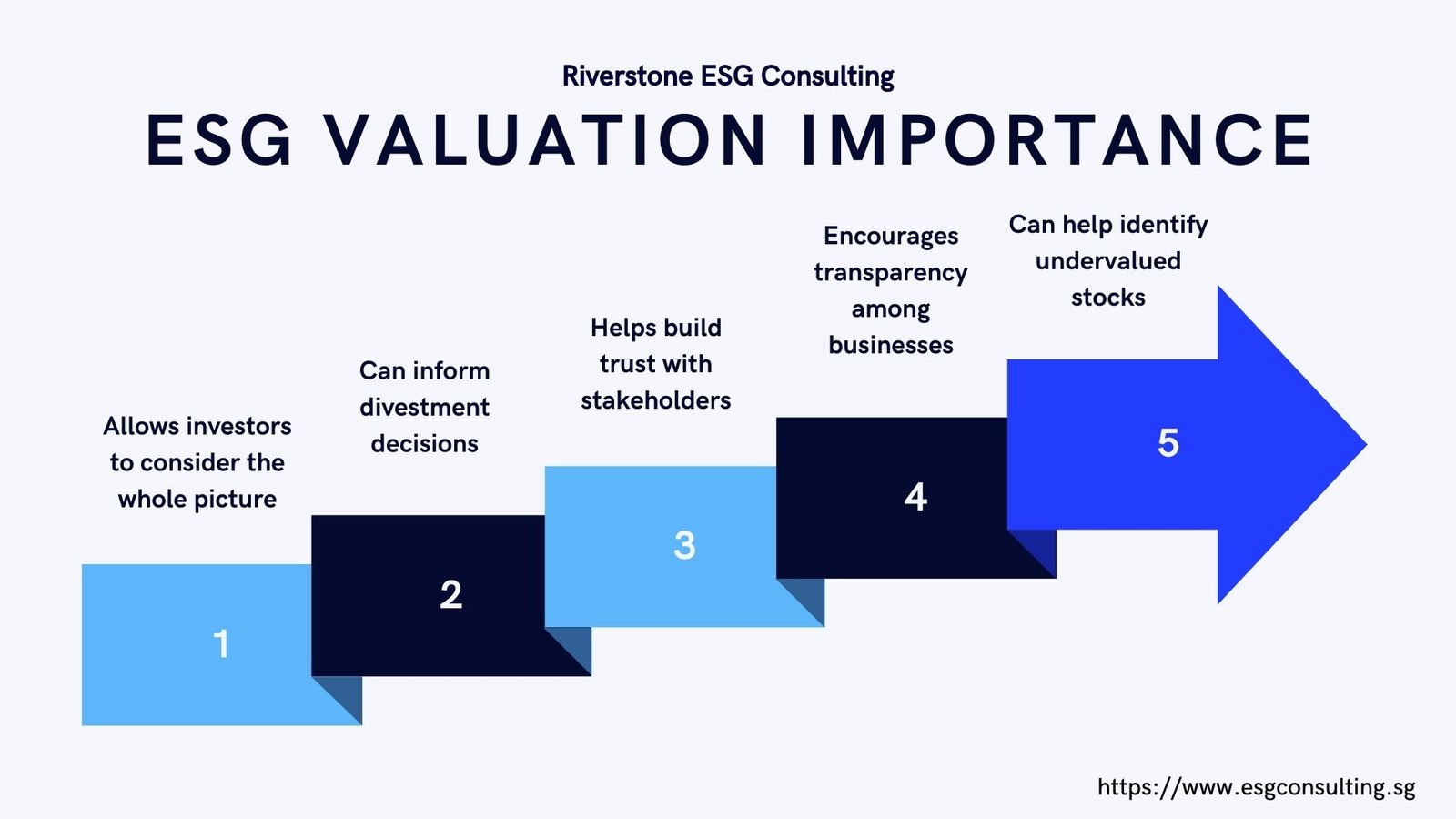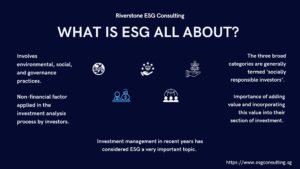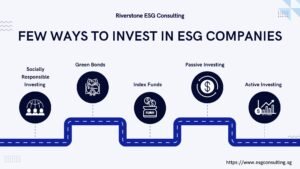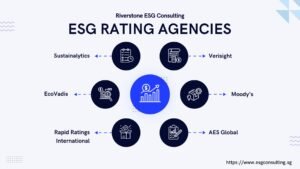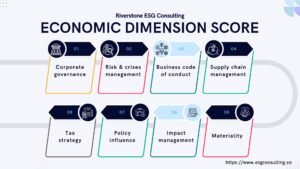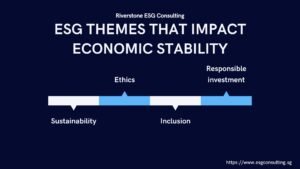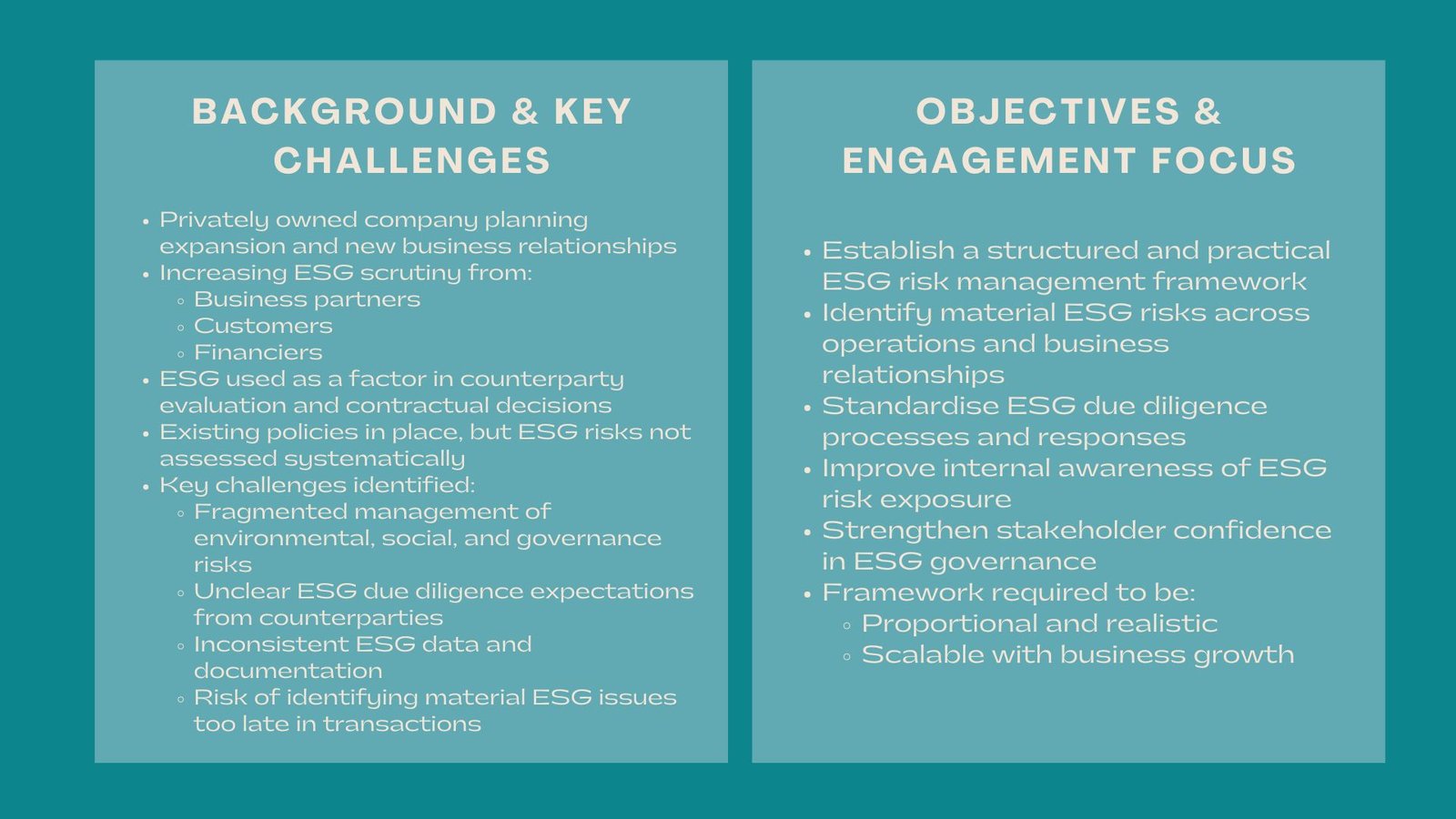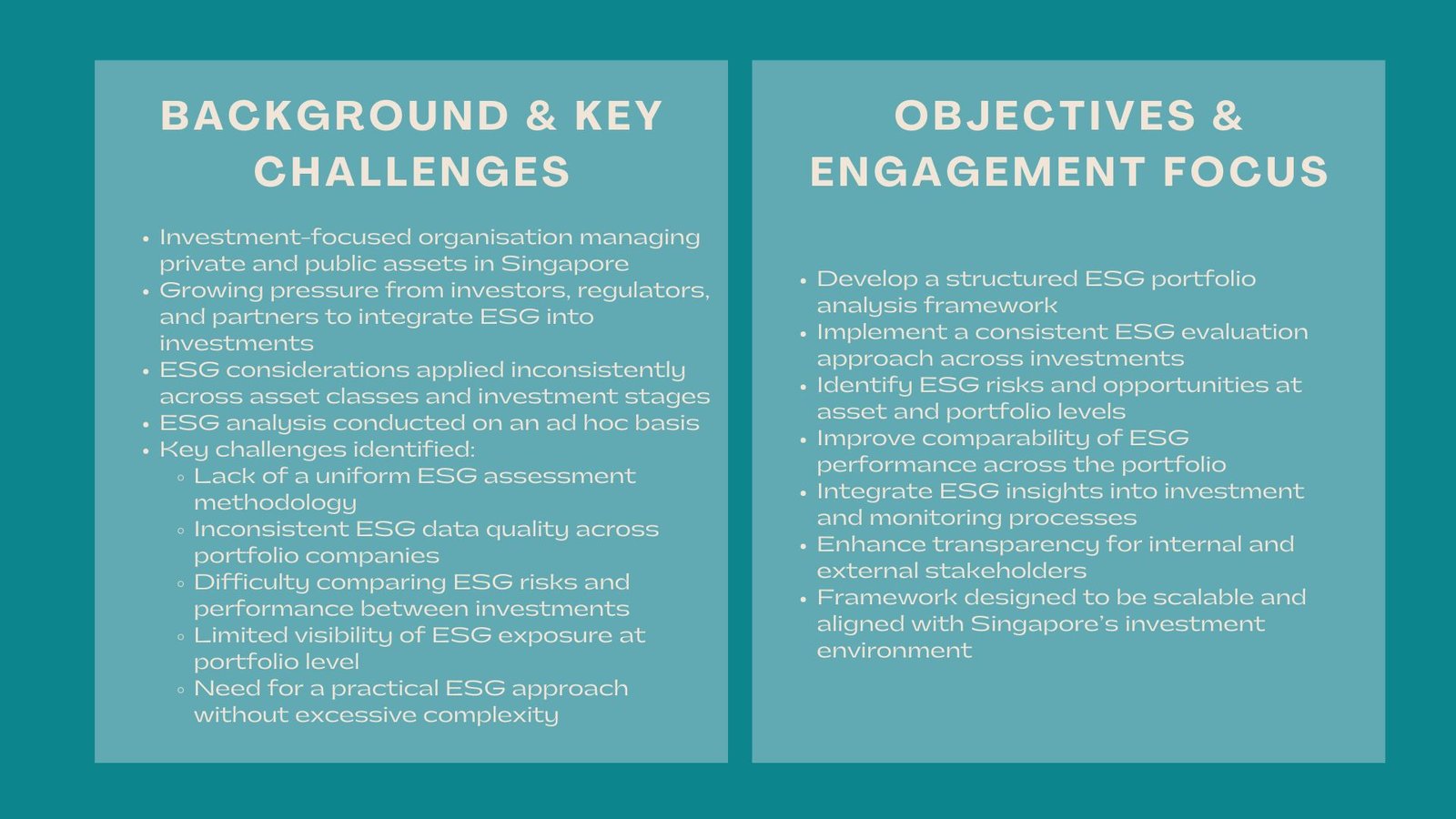Demystifying ESG Valuation: Trends and Best Practices
Understanding ESG Valuation: An Overview
Defining ESG Valuation: Core Principles Explained
- ESG valuation involves assessing environmental, social, and governance factors to provide a more holistic picture of a company’s risk profile.
- It is an emerging field that seeks to determine how ESGs influence a company’s value.
The ESG Valuation Process: Key Steps and Considerations in Singapore
The following are the key steps involved in the evaluation of ESG:
- Identify and list relevant ESG metrics. – First, investors should identify and then list out the key ESG factors that will affect the company’s performance.?
- Assess current exposure levels to these factors:- Second, investors should assess at what level the company is exposed to each ESG metrics.
- Conduct a financial analysis of the company:- Third, investors should conduct a financial analysis of the company to understand its current performance and prospects.
- Evaluate how each ESG metrics affects the company’s value:- Fourth, investors should evaluate how each ESG metrics affects the company’s value.
- Synthesize the findings and develop a risk profile:– Fifth, investors should synthesize the findings to develop a holistic risk profile for the company.
Exploring Different Approaches to ESG Valuation
When valuing a company, investors need to take into account the company’s exposure to ESG risks and how well it is managing those risks. To do this, investors use a number of different valuation approaches including:
- The discounted cash flow (DCF) approach: This is the most common method used to value companies and takes into account future cash flows and the time value of money.
- The residual income (RI) approach: This approach uses a company’s operating profit less a charge for the cost of capital.
- The excess earnings (EE) approach: This looks at a company’s reported earnings and compares them to what its sustainable earnings should be.
- The replacement cost (RC) approach: This is the current cost of building and replacing assets, minus any depreciation costs.
- The market comparable (MC) approach: This uses a set of comparable public companies and calculates the ratio between their share price and earnings per share.
Why ESG Valuation Matters: Unveiling Its Importance
- It allows investors to consider the whole picture.
- It can inform divestment decisions.
- It helps build trust with stakeholders.
- It encourages transparency among businesses.
- It can help identify undervalued stocks.
Understanding Current ESG Valuation Trends and Best Practices in Consulting
ESG valuation is no longer just a niche topic — it’s shaping the way businesses and consultants make decisions. From measuring climate risks to assessing social impact, the game is changing fast. If you’re looking to stay ahead, this guide on ESG valuation breaks down the latest trends and practical best practices you can actually use.
ESG Valuation Best Practices for Investors in Singapore
Investors in Singapore are paying closer attention to ESG — and not just for ethics, but performance. Knowing how to value ESG properly can uncover risks and open up new opportunities. If you’re investing with impact, these best practices help you make smarter, more informed decisions with confidence.
Latest Trends in ESG Valuation and How to Implement Best Practices
ESG is changing how we define business value. From data-led insights to integrated reporting, valuation is getting a major upgrade. If you’re wondering how to actually apply this in real-world decisions, explore the latest ESG valuation trends and how to use them effectively.
Comprehensive Guide to ESG Valuation Trends and Best Practices for Sustainability
Trying to connect sustainability goals to real business value? That’s where ESG valuation comes in. This comprehensive guide helps you cut through the complexity, covering everything from frameworks to practical steps, so you can back up your sustainability efforts with numbers that matter.
ESG Consulting Singapore: Demystifying Valuation Trends and Best Practices
If you’re navigating ESG in Singapore, knowing how valuation works is key — especially with rising investor scrutiny. This practical guide takes the guesswork out of ESG valuation, making it easier to apply insights to strategy, reporting, and consulting engagements.
How to Understand ESG Valuation: Current Trends and Best Practices Explained
Trying to make sense of ESG valuation? You’re not alone. With evolving standards and new metrics, it can feel a bit overwhelming. This easy-to-follow guide breaks down what matters most — helping you understand where things are headed and how to stay aligned with best practices.
ESG Valuation Trends and Best Practices: A Guide for Corporate Strategy
For forward-thinking companies, ESG isn’t just a report — it’s part of the business strategy. Understanding how to value ESG efforts helps build credibility and long-term growth. This strategy-focused guide shows how to use ESG valuation to inform better decisions at the leadership level.
Best Practices in Environmental Social Governance Valuation: Latest Trends
Valuing ESG performance is evolving fast — and for good reason. Investors, customers, and regulators all want proof, not just promises. This helpful breakdown explores the latest trends and what “best practice” really looks like when it comes to ESG valuation today.
Demystifying the Process of ESG Valuation: Trends and Practical Advice
Let’s face it — ESG valuation can feel complex. But when you break it down, it becomes a powerful tool for clarity and strategy. This no-nonsense guide makes sense of the process, offering trends and practical tips to help you take action with confidence.
How ESG Valuation Reflects and Enhances Organizational Performance
ESG has greatly helped to improve an organization’s performance through the following ways.
- It helps an organization gain market share by building trust with stakeholders
- It creates a competitive advantage for the company by positioning it as one that is ethical and sustainable (and therefore more likely to attract talent)
- As liabilities become more apparent, having clear evidence of how these were identified and managed will provide breathing room during legal proceedings related to new regulations
- Investors may demand compensation for potential charges arising from ESG risks, so proper monitoring can help avoid this situation.
- It helps avoid legal risks: In the past few years, there have been increasing lawsuits related to climate change and other ESG related issues.
- ESG valuation can help companies identify sustainable opportunities within their current business model that will increase profits by highlighting potential areas of development or investment.
- Investors can identify undervalued stocks that have high-risk factors in some regions but not others so they may better diversify investments geographically as well as across industries and sectors.
- Investors use information about management teams’ commitment to ESG issues as part of their due diligence process during mergers and acquisitions.

